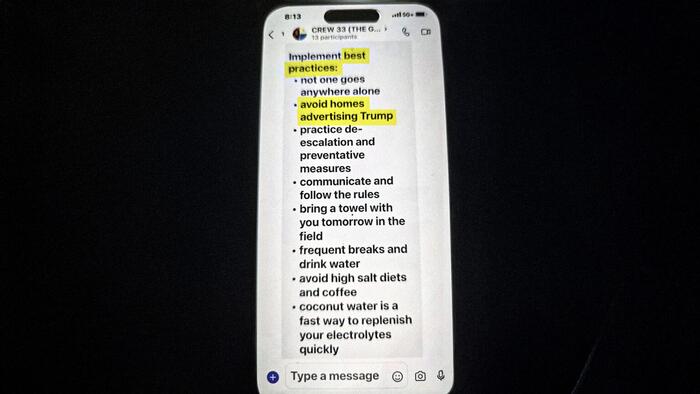An employee with the Federal Emergency Management Agency (FEMA) has sparked controversy after a leaked internal message revealed a directive to avoid assisting homes displaying support for Trump during damage assessments following Hurricane Milton in Florida. The supervisor, identified as Marn’i Washington, allegedly instructed FEMA workers to bypass residences with Trump signs while surveying the community of Lake Placid, provoking outrage among colleagues and members of the public alike. This directive, shown in a Microsoft Teams chat, raised severe ethical questions about the impartiality expected from a federal agency that is tasked with aiding disaster victims without bias towards their political affiliations.
Multiple government officials corroborated reports that Washington not only made this instruction in a group chat but also conveyed it verbally to her team. This incident has led several FEMA employees to express their disbelief and anger, with one worker articulating that the idea of discriminating against residents based on their political beliefs was “unbelievable.” Their comments emphasized that during times of crisis, all individuals, regardless of their support for any political figure, deserve equal assistance and compassion. This sentiment reinforced the core principles of disaster relief that are meant to transcend political divisions, highlighting the moral implications of such biased directives from government representatives.
As concern grew, especially amid criticism of the Biden administration’s overall response to natural disasters, the decision not to assist certain households drew significant attention. The incident also unfolded while communities such as Roan Mountain, Tennessee, reported slow responses from FEMA following Hurricane Helene, where residents faced significant delays in federal aid. The apparent inconsistency in the administration’s approach, particularly in areas with overwhelming support for Trump, raised alarms about inequitable treatment under federal programs, further intensifying scrutiny of how political affiliations may influence disaster relief efforts.
In the wake of the leaked message, Florida Governor Ron DeSantis swiftly called for an investigation into the matter, condemning the perceived politicization of a federal agency within a disaster response context. DeSantis characterized the situation as a part of a growing trend of partisanship in federal bureaucracy under the current administration, expressing optimism for political shifts that would address these issues. His reaction underscored ongoing tensions between state and federal authorities and highlighted the dissatisfaction voiced by constituents in heavily Republican areas feels sidelined in federal assistance programs.
In response to the uproar, FEMA announced Washington’s removal from her role. The agency reiterated its commitment to serving all disaster survivors without regard to political affiliation, labeling the supervisor’s directives as an isolated incident that warranted immediate action. However, this response has not quelled public outrage. Critics pointed out that merely removing her from a supervisory position does not guarantee accountability or change systemic issues within the agency, with calls for further action, including potential legal consequences. Observers are now questioning whether such disciplinary steps are sufficient to ensure equity in disaster relief operations moving forward.
In summation, the revelation of FEMA directing employees to skip homes of Trump supporters following Hurricane Milton has raised serious ethical concerns regarding the impartiality of federal disaster response efforts. The fallout has prompted calls for investigations and accountability, reflecting broader anxieties about partisanship in government agencies. While FEMA’s response indicates a commitment to non-partisan aid, skepticism persists regarding their ability to deliver equitable support, particularly in politically charged environments. This incident not only illustrates the need for oversight within federal agencies but also the importance of ensuring that assistance during crises remains unbiased and focused solely on the needs of affected individuals.

